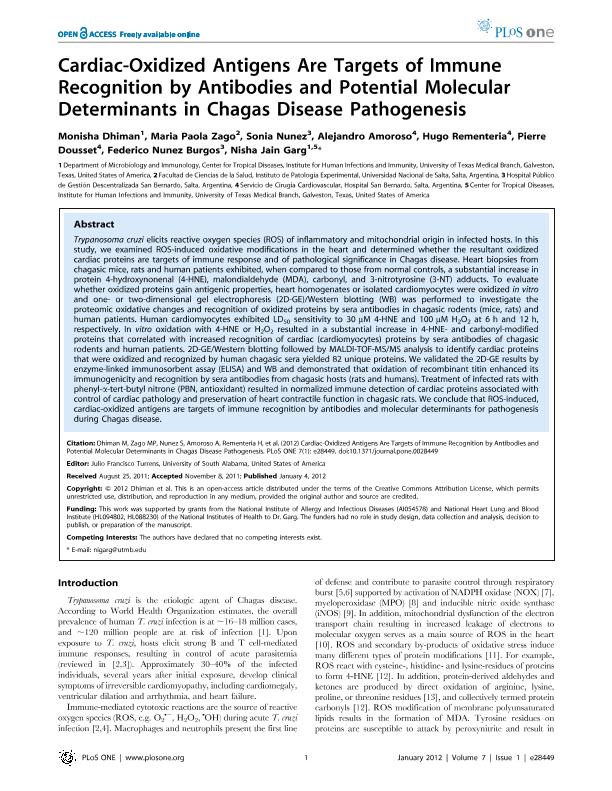Artículo
Cardiac-oxidized antigens are targets of immune recognition by antibodies and potential molecular determinants in chagas disease pathogenesis
Dhiman, Monisha; Zago, María Paola ; Nuñez, Sonia; Amoroso, Alejandro; Rementeria, Hugo; Dousset, Pierre; Nuñez Burgos Dopazo, Federico Martìn; Garg, Nisha Jain
; Nuñez, Sonia; Amoroso, Alejandro; Rementeria, Hugo; Dousset, Pierre; Nuñez Burgos Dopazo, Federico Martìn; Garg, Nisha Jain
 ; Nuñez, Sonia; Amoroso, Alejandro; Rementeria, Hugo; Dousset, Pierre; Nuñez Burgos Dopazo, Federico Martìn; Garg, Nisha Jain
; Nuñez, Sonia; Amoroso, Alejandro; Rementeria, Hugo; Dousset, Pierre; Nuñez Burgos Dopazo, Federico Martìn; Garg, Nisha Jain
Fecha de publicación:
01/2012
Editorial:
Public Library of Science
Revista:
Plos One
ISSN:
1932-6203
Idioma:
Inglés
Tipo de recurso:
Artículo publicado
Clasificación temática:
Resumen
Trypanosoma cruzi elicits reactive oxygen species (ROS) of inflammatory and mitochondrial origin in infected hosts. In this study, we examined ROS-induced oxidative modifications in the heart and determined whether the resultant oxidized cardiac proteins are targets of immune response and of pathological significance in Chagas disease. Heart biopsies from chagasic mice, rats and human patients exhibited, when compared to those from normal controls, a substantial increase in protein 4-hydroxynonenal (4-HNE), malondialdehyde (MDA), carbonyl, and 3-nitrotyrosine (3-NT) adducts. To evaluate whether oxidized proteins gain antigenic properties, heart homogenates or isolated cardiomyocytes were oxidized in vitro and one- or two-dimensional gel electrophoresis (2D-GE)/Western blotting (WB) was performed to investigate the proteomic oxidative changes and recognition of oxidized proteins by sera antibodies in chagasic rodents (mice, rats) and human patients. Human cardiomyocytes exhibited LD 50 sensitivity to 30 μM 4-HNE and 100 μM H 2O 2 at 6 h and 12 h, respectively. In vitro oxidation with 4-HNE or H 2O 2 resulted in a substantial increase in 4-HNE- and carbonyl-modified proteins that correlated with increased recognition of cardiac (cardiomyocytes) proteins by sera antibodies of chagasic rodents and human patients. 2D-GE/Western blotting followed by MALDI-TOF-MS/MS analysis to identify cardiac proteins that were oxidized and recognized by human chagasic sera yielded 82 unique proteins. We validated the 2D-GE results by enzyme-linked immunosorbent assay (ELISA) and WB and demonstrated that oxidation of recombinant titin enhanced its immunogenicity and recognition by sera antibodies from chagasic hosts (rats and humans). Treatment of infected rats with phenyl-α-tert-butyl nitrone (PBN, antioxidant) resulted in normalized immune detection of cardiac proteins associated with control of cardiac pathology and preservation of heart contractile function in chagasic rats. We conclude that ROS-induced, cardiac-oxidized antigens are targets of immune recognition by antibodies and molecular determinants for pathogenesis during Chagas disease.
Palabras clave:
Chagas Desease
,
Oxidative Stress
,
Pathogenesis
Archivos asociados
Licencia
Identificadores
Colecciones
Articulos(IPE)
Articulos de INST.DE PATOLOGIA EXPERIMENTAL
Articulos de INST.DE PATOLOGIA EXPERIMENTAL
Citación
Dhiman, Monisha; Zago, María Paola; Nuñez, Sonia; Amoroso, Alejandro; Rementeria, Hugo; et al.; Cardiac-oxidized antigens are targets of immune recognition by antibodies and potential molecular determinants in chagas disease pathogenesis; Public Library of Science; Plos One; 7; 1; 1-2012; 1-13
Compartir
Altmétricas



